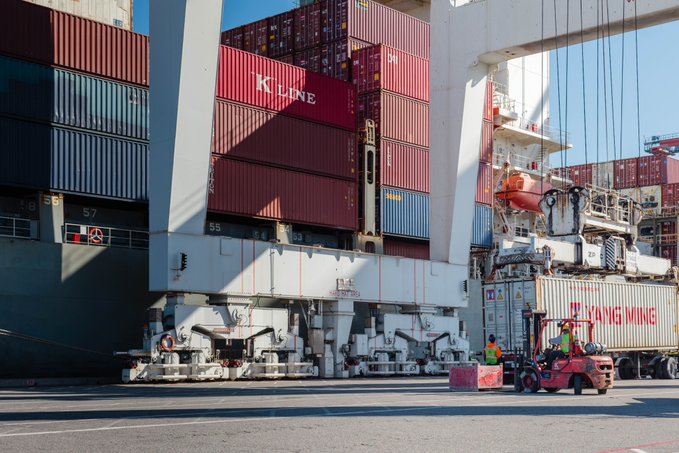The update: ships in-out on time, truck queues down, cargo moving without delay
Uncertainty clouds the peak season container shipping outlook with more threatened tariffs on Chinese imports to the U.S. looming. But the Port of Oakland said yesterday that there’s no uncertainty about handling the annual August-November cargo rush.

“The Port is operating efficiently, ships are getting in-and-out on time and cargo is moving without delay,” said Maritime Director John Driscoll. “We don’t see that changing in the coming months.”
The Port said it wouldn’t project volume for shipping’s traditional highwater mark when imports increase to support holiday merchandising. It advised, however, that Oakland marine terminals where ships load and unload are reporting uninterrupted operations. It added that it expected cargo to continue flowing unfettered through the peak season.
West Coast peak season containerized import growth is likely to be 1-to-3 percent, trade analysts say. That’s modest compared to big jumps last peak season when importers front-loaded against expected tariffs. The wildcard is a new round of tariffs proposed by the Trump Administration that could take effect next month.
Regardless of trade dynamics, Oakland says it’s ready for peak season. Here’s the operational update it provided:
- Vessel operations: Ships are routinely arriving on time this summer and completing cargo operations within 24 hours.
- Import deliveries: Import containers are generally delivered to cargo owners within 1-to-3 days of vessel discharge.
- Turn times: Average transaction times for truck drivers at Oakland’s three international marine terminals range from 59-to-75 minutes. That’s down from a range of 67-to-92 minutes in January.
- Street queues: Lines of trucks waiting to enter marine terminals aren’t as prevalent as they used to be in Oakland. Night gates and appointment systems have helped shrink the queues. Lines still form in the morning before gates open and again during lunch hour. There are also lines Mondays and Tuesdays following weekend vessel arrivals. But terminals for the most part are working efficiently to ease back-ups.
- Chassis to haul containers: They’re usually available without shortages though providers do have to relocate some units among terminals to avoid imbalance.
- Containers: Oakland’s near 50-50 import/export balance eliminates most worries about container shortages. The Port ships large numbers of empties back to Asia but there are no supply problems in Oakland.
- Night gates: About 25-to-30 percent of truck transactions are occurring at night Monday-through-Thursday in Oakland. Marine terminal operators are urging drivers to haul more cargo at night to ease daytime crowding.
Source: Port of Oakland